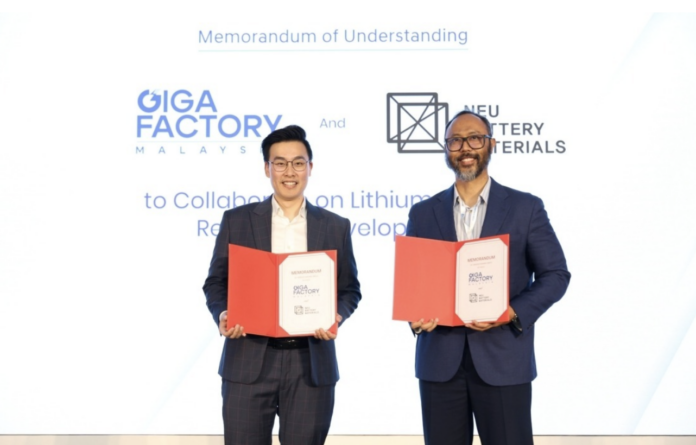SINGAPORE, Aug 23 – GigaFactory Malaysia Sdn Bhd (GMSB), a subsidiary of NanoMalaysia Bhd, today signed two Memoranda of Understanding (MoU) on battery technology collaboration with counterparts from Singapore and Thailand.
The signing ceremony at the ongoing 2nd ASEAN Battery Technology Conference (ABTC 2024) in Sentosa today is an extension of an agreement signed at the 1st ASEAN Battery and Electric Vehicle Technology Conference in Bali, Indonesia last year to promote cross-country collaboration within the region on battery technology.
GMSB’s agreement with Singapore-based NEU Battery Materials Pte Ltd (NEU) will focus on developing gigafactory-level operations and manufacturing of innovative battery technologies, incorporating nanomaterials for mobility and stationary applications.
NanoMalaysia chief executive officer (CEO) Dr Rezal Khairi Ahmad said NEU will ensure a steady supply of recycled battery materials such as lithium carbonate and other metals are made available to GMSB’s Hydrogen-Electric Vehicle-Battery (HEBATT) Centre for performance testing.
Rezal Khairi signed on behalf of GMSB while NEU was represented by its CEO Bryan Oh.
NEU specialises in lithium iron phosphate battery recycling.
“We have the technology, and we aspire to produce our batteries on a larger scale to meet industrial and commercial expectations. The common question that’s been asked by investors is, are we able to secure lithium?
“So this is where NEU comes into the picture, the company can produce or extract lithium from discarded batteries that would add another new dimension of green and circular economy efforts in Malaysia,” he told a press conference after the signing event.
Meanwhile, GMSB’s collaboration with Thailand’s Khon Kaen University (KKU) will leverage their joint expertise and resources. The university through its Battery and New Energy Science and Technology Factory (UVOLT) will serve as the outsourced manufacturer for batteries developed by GMSB.
The collaboration will also provide knowledge sharing in battery testing and certification that will lead to productivity advancements at HEBATT Centre.
Rezal Khairi represented GMSB while KKU was represented by UVOLT director Prof Nonglak Meethong.
“GMSB’s capacity is in kilowatt-hour (kWh) while UVOLT (operates) at megawatt-hour (MWh). This collaboration will allow us to jump at light speed in our aspiration to scale up our battery production,” he said.
Nonglak said: “Lithium-ion battery is dangerous, so it needs to be produced in a controlled way and in a controlled environment to make them perform the way they should.
“We have the facilities, and we hope the facilities will not just benefit the material developers in Thailand but will also be beneficial for other countries, especially in ASEAN.”
Meanwhile, another MoU signed at ABTC 2024 is between Singapore’s Institute of Materials Research and Engineering (IMRE) and INV Corporation on joint research to develop hybrid battery separators that will address the challenges of safety faced by current rechargeable batteries.
This collaboration seeks to play on the strengths and intellectual property rights in solid-state batteries developed in Singapore.
Held from Aug 21-23, the ABTC 2024 attracted over 320 participants from 16 countries.
The event is hosted by the Singapore Battery Consortium and co-organised by NanoMalaysia, Thailand Energy Storage Technology Association, Indonesia’s National Battery Research Institute and National Centre for Sustainable Transportation Technology, and the Electric Vehicle Association of the Philippines.
















